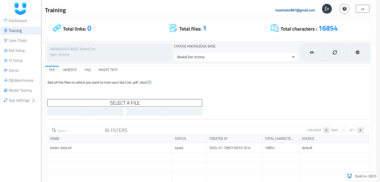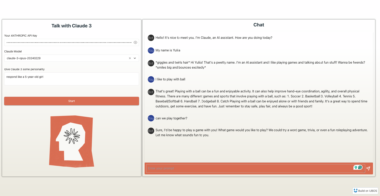MCP-Mem0: Long-Term Memory for AI Agents

A template implementation of the Model Context Protocol (MCP) server integrated with Mem0 for providing AI agents with persistent memory capabilities.
Use this as a reference point to build your MCP servers yourself, or give this as an example to an AI coding assistant and tell it to follow this example for structure and code correctness!
Overview
This project demonstrates how to build an MCP server that enables AI agents to store, retrieve, and search memories using semantic search. It serves as a practical template for creating your own MCP servers, simply using Mem0 and a practical example.
The implementation follows the best practices laid out by Anthropic for building MCP servers, allowing seamless integration with any MCP-compatible client.
Features
The server provides three essential memory management tools:
save_memory: Store any information in long-term memory with semantic indexingget_all_memories: Retrieve all stored memories for comprehensive contextsearch_memories: Find relevant memories using semantic search
Prerequisites
- Python 3.12+
- Supabase or any PostgreSQL database (for vector storage of memories)
- API keys for your chosen LLM provider (OpenAI, OpenRouter, or Ollama)
- Docker if running the MCP server as a container (recommended)
Installation
Using uv
Install uv if you don’t have it:
pip install uvClone this repository:
git clone https://github.com/coleam00/mcp-mem0.git cd mcp-mem0Install dependencies:
uv pip install -e .Create a
.envfile based on.env.example:cp .env.example .envConfigure your environment variables in the
.envfile (see Configuration section)
Using Docker (Recommended)
Build the Docker image:
docker build -t mcp/mem0 --build-arg PORT=8050 .Create a
.envfile based on.env.exampleand configure your environment variables
Configuration
The following environment variables can be configured in your .env file:
| Variable | Description | Example |
|---|---|---|
TRANSPORT | Transport protocol (sse or stdio) | sse |
HOST | Host to bind to when using SSE transport | 0.0.0.0 |
PORT | Port to listen on when using SSE transport | 8050 |
LLM_PROVIDER | LLM provider (openai, openrouter, or ollama) | openai |
LLM_BASE_URL | Base URL for the LLM API | https://api.openai.com/v1 |
LLM_API_KEY | API key for the LLM provider | sk-... |
LLM_CHOICE | LLM model to use | gpt-4o-mini |
EMBEDDING_MODEL_CHOICE | Embedding model to use | text-embedding-3-small |
DATABASE_URL | PostgreSQL connection string | postgresql://user:pass@host:port/db |
Running the Server
Using uv
SSE Transport
# Set TRANSPORT=sse in .env then:
uv run src/main.py
The MCP server will essentially be run as an API endpoint that you can then connect to with config shown below.
Stdio Transport
With stdio, the MCP client iself can spin up the MCP server, so nothing to run at this point.
Using Docker
SSE Transport
docker run --env-file .env -p:8050:8050 mcp/mem0
The MCP server will essentially be run as an API endpoint within the container that you can then connect to with config shown below.
Stdio Transport
With stdio, the MCP client iself can spin up the MCP server container, so nothing to run at this point.
Integration with MCP Clients
SSE Configuration
Once you have the server running with SSE transport, you can connect to it using this configuration:
{
"mcpServers": {
"mem0": {
"transport": "sse",
"url": "http://localhost:8050/sse"
}
}
}
Note for Windsurf users: Use
serverUrlinstead ofurlin your configuration:{ "mcpServers": { "mem0": { "transport": "sse", "serverUrl": "http://localhost:8050/sse" } } }
Note for n8n users: Use host.docker.internal instead of localhost since n8n has to reach outside of it’s own container to the host machine:
So the full URL in the MCP node would be: http://host.docker.internal:8050/sse
Make sure to update the port if you are using a value other than the default 8050.
Python with Stdio Configuration
Add this server to your MCP configuration for Claude Desktop, Windsurf, or any other MCP client:
{
"mcpServers": {
"mem0": {
"command": "your/path/to/mcp-mem0/.venv/Scripts/python.exe",
"args": ["your/path/to/mcp-mem0/src/main.py"],
"env": {
"TRANSPORT": "stdio",
"LLM_PROVIDER": "openai",
"LLM_BASE_URL": "https://api.openai.com/v1",
"LLM_API_KEY": "YOUR-API-KEY",
"LLM_CHOICE": "gpt-4o-mini",
"EMBEDDING_MODEL_CHOICE": "text-embedding-3-small",
"DATABASE_URL": "YOUR-DATABASE-URL"
}
}
}
}
Docker with Stdio Configuration
{
"mcpServers": {
"mem0": {
"command": "docker",
"args": ["run", "--rm", "-i",
"-e", "TRANSPORT",
"-e", "LLM_PROVIDER",
"-e", "LLM_BASE_URL",
"-e", "LLM_API_KEY",
"-e", "LLM_CHOICE",
"-e", "EMBEDDING_MODEL_CHOICE",
"-e", "DATABASE_URL",
"mcp/mem0"],
"env": {
"TRANSPORT": "stdio",
"LLM_PROVIDER": "openai",
"LLM_BASE_URL": "https://api.openai.com/v1",
"LLM_API_KEY": "YOUR-API-KEY",
"LLM_CHOICE": "gpt-4o-mini",
"EMBEDDING_MODEL_CHOICE": "text-embedding-3-small",
"DATABASE_URL": "YOUR-DATABASE-URL"
}
}
}
}
Building Your Own Server
This template provides a foundation for building more complex MCP servers. To build your own:
- Add your own tools by creating methods with the
@mcp.tool()decorator - Create your own lifespan function to add your own dependencies (clients, database connections, etc.)
- Modify the
utils.pyfile for any helper functions you need for your MCP server - Feel free to add prompts and resources as well with
@mcp.resource()and@mcp.prompt()
Long-Term Memory for AI Agents
Project Details
- coleam00/mcp-mem0
- MIT License
- Last Updated: 4/18/2025
Recomended MCP Servers

A Model Context Protocol (MCP) server for interacting with Bugsnag. This server allows LLM tools like Cursor and...

A systematic reasoning MCP server implementation for Claude Desktop with beam search and thought evaluation.
An MCP for WireShark (tshark). Empower LLM's with realtime network traffic analysis capability
The (Unofficial) dubco-mcp-server enables AI assistants to manage Dub.co short links via the Model Context Protocol. It provides...

MCP Server for Gmail and Calendar

OpenAPI Schema Model Context Protocol Server

Model Context Protocol server to allow for reading and writing from Pinecone. Rudimentary RAG
The Cursor10x MCP is a persistent multi-dimensional memory system for Cursor that enhances AI assistants with conversation context,...
Go server implementing Model Context Protocol (MCP) for filesystem operations.
Diff & patch JavaScript objects
 From vibe coding to vibe deployment. UBOS MCP turns ideas into infra with one message.
From vibe coding to vibe deployment. UBOS MCP turns ideas into infra with one message.






